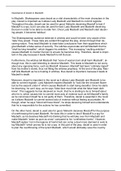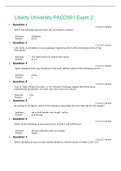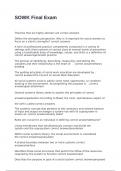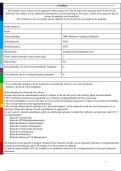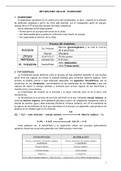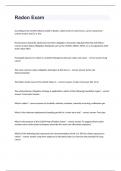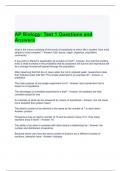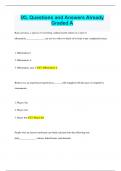Importance of deceit in Macbeth
In Macbeth, Shakespeare uses deceit as a vital characteristic of the main characters in the
play. Deceit is important as it allows Lady Macbeth and Macbeth to commit regicide.
Throughout the play, deceit can be used for good; Malcolm deceiving Macduff to test if
Macduff is a spy, but it can also be used for bad; Lady Macbeth and Macbeth deceiving
Duncan in order to be able to murder him. Once Lady Macbeth and Macbeth start deceiv-
ing people, it becomes habitual.
The Shakespearean audience believed in witches and would’ve been very aware of the
‘risks’ they posed. These risks are evident throughout the play, shown through their de-
ceiving nature. They lead Macbeth to draw false conclusions from their apparitions which
give Macbeth a false sense of security. The witches equivocate and tell Macbeth that he
“shall be king hereafter”, which triggers his ambition. This increasing “vaulting ambition”
causes Macbeth to murder Duncan to ensure he becomes king. Therefore, deceit is impor-
tant in the play because it leads Macbeth to kill Duncan.
Furthermore, the witches tell Macbeth that “none of woman born shall harm Macbeth”, al-
though true, this is said intending to deceive Macbeth. This leads to Macbeth to not worry
about any opposing force, such as Macduff. However, Macduff had been “untimely ripped”
from his mother’s womb, thus not fitting the witches prophesy. At the end of the play, Mac-
duff kills Macbeth as he is trusting in witches, thus deceit is important, because it leads to
Macbeth’s death.
Moreover, deceit is important in the novel as it allows Lady Macbeth and Macbeth to be
able to commit regicide. Lady Macbeth inspires Macbeth to “look like the innocent flower
but be the serpent under it” which causes Macbeth to start being deceitful. Once he starts
he deceiving, he can’t stop, as he says “false face must hide what the false heart doth
know”. This suggests he has deceived so much, that he is starting to lie to himself about
who he is, which causes him to commit more acts of violence such as kill Macduff’s family
as he convinces himself he is not guilty of them. Therefore, deceit is essential in the novel
as it allows Macbeth to commit several acts of violence without feeling accountable. Al-
though, when he says “blood will have blood”, he stops deceiving himself and understands
that he is responsible for the actions he has committed.
On the other hand, deceit is used also for good, Malcolm deceives Macduff for the purpose
of overthrowing the tyrant Macbeth. He does this in order to test if Macduff is a spy for
Macbeth, as he deceives Macduff into thinking that he will take over from Macbeth and
make Macbeth “seem as pure as snow” compared to his “confineless harms”. However,
Macduff replies “not in the legions of horrid hell can come a devil more damned in evils to
top Macbeth” which proves he is not a spy. In this part of the play, deceit is used in order
to plan the overthrowing of the tyrant Macbeth, which would ultimately save the country.
In Macbeth, Shakespeare uses deceit as a vital characteristic of the main characters in the
play. Deceit is important as it allows Lady Macbeth and Macbeth to commit regicide.
Throughout the play, deceit can be used for good; Malcolm deceiving Macduff to test if
Macduff is a spy, but it can also be used for bad; Lady Macbeth and Macbeth deceiving
Duncan in order to be able to murder him. Once Lady Macbeth and Macbeth start deceiv-
ing people, it becomes habitual.
The Shakespearean audience believed in witches and would’ve been very aware of the
‘risks’ they posed. These risks are evident throughout the play, shown through their de-
ceiving nature. They lead Macbeth to draw false conclusions from their apparitions which
give Macbeth a false sense of security. The witches equivocate and tell Macbeth that he
“shall be king hereafter”, which triggers his ambition. This increasing “vaulting ambition”
causes Macbeth to murder Duncan to ensure he becomes king. Therefore, deceit is impor-
tant in the play because it leads Macbeth to kill Duncan.
Furthermore, the witches tell Macbeth that “none of woman born shall harm Macbeth”, al-
though true, this is said intending to deceive Macbeth. This leads to Macbeth to not worry
about any opposing force, such as Macduff. However, Macduff had been “untimely ripped”
from his mother’s womb, thus not fitting the witches prophesy. At the end of the play, Mac-
duff kills Macbeth as he is trusting in witches, thus deceit is important, because it leads to
Macbeth’s death.
Moreover, deceit is important in the novel as it allows Lady Macbeth and Macbeth to be
able to commit regicide. Lady Macbeth inspires Macbeth to “look like the innocent flower
but be the serpent under it” which causes Macbeth to start being deceitful. Once he starts
he deceiving, he can’t stop, as he says “false face must hide what the false heart doth
know”. This suggests he has deceived so much, that he is starting to lie to himself about
who he is, which causes him to commit more acts of violence such as kill Macduff’s family
as he convinces himself he is not guilty of them. Therefore, deceit is essential in the novel
as it allows Macbeth to commit several acts of violence without feeling accountable. Al-
though, when he says “blood will have blood”, he stops deceiving himself and understands
that he is responsible for the actions he has committed.
On the other hand, deceit is used also for good, Malcolm deceives Macduff for the purpose
of overthrowing the tyrant Macbeth. He does this in order to test if Macduff is a spy for
Macbeth, as he deceives Macduff into thinking that he will take over from Macbeth and
make Macbeth “seem as pure as snow” compared to his “confineless harms”. However,
Macduff replies “not in the legions of horrid hell can come a devil more damned in evils to
top Macbeth” which proves he is not a spy. In this part of the play, deceit is used in order
to plan the overthrowing of the tyrant Macbeth, which would ultimately save the country.


